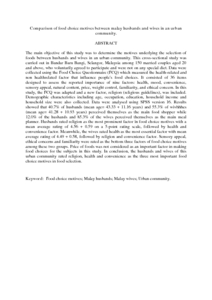Citation
Abdullah, Asma and Abdul Ghani, Nawalyah and Mohd Yusof, Rokiah and Mohd Taib, Mohd Nasir
(2010)
Comparison of food choice motives between malay husbands and wives in an urban community.
Malaysian Journal of Nutrition, 16 (1).
pp. 69-81.
ISSN 1394-035X
Abstract
The main objective of this study was to determine the motives underlying the selection of foods between husbands and wives in an urban community. This cross-sectional study was carried out in Bandar Baru Bangi, Selangor, Malaysia among 150 married couples aged 20 and above, who voluntarily agreed to participate and were not on any special diet. Data were collected using the Food Choice Questionnaire (FCQ) which measured the health-related and non healthrelated factor that influence people's food choices. It consisted of 36 items designed to assess the reported importance of nine factors: health, mood, convenience, sensory appeal, natural content, price, weight control, familiarity, and ethical concern. In this study, the FCQ was adapted and a new factor, religion (religious guidelines), was included. Demographic characteristics including age, occupation, education, household income and household size were also collected. Data were analysed using SPSS version 16. Results showed that 40.7% of husbands (mean age= 43.33 + 11.16 years) and 55.3% of wives (mean age= 41.28 + 10.93 years) perceived themselves as the main food shopper while 12.0% of the husbands and 85.3% of the wives perceived themselves as the main meal planner. Husbands rated religion as the most prominent factor in food choice motives with a mean average rating of 4.56 + 0.59 on a 5-point rating scale, followed by health and convenience factor. Meanwhile, the wives rated health as the most essential factor with mean average rating of 4.49 + 0.58, followed by religion and convenience factor. Sensory appeal, ethical concerns and familiarity were rated as the bottom three factors of food choice motives among these two groups. Price of foods was not considered as an important factor in making food choices for the subjects in this study. In conclusion, the husbands and wives of this urban community rated religion, health and convenience as the three most important food choice motives in food selection.
Download File
![[img]](http://psasir.upm.edu.my/13691/1.hassmallThumbnailVersion/Comparison%20of%20food%20choice%20motives%20between%20malay%20husbands%20and%20wives%20in%20an%20urban%20community.pdf)  Preview |
|
PDF (Abstract)
Comparison of food choice motives between malay husbands and wives in an urban community.pdf
Download (86kB)
| Preview
|
|
Additional Metadata
Actions (login required)
 |
View Item |

